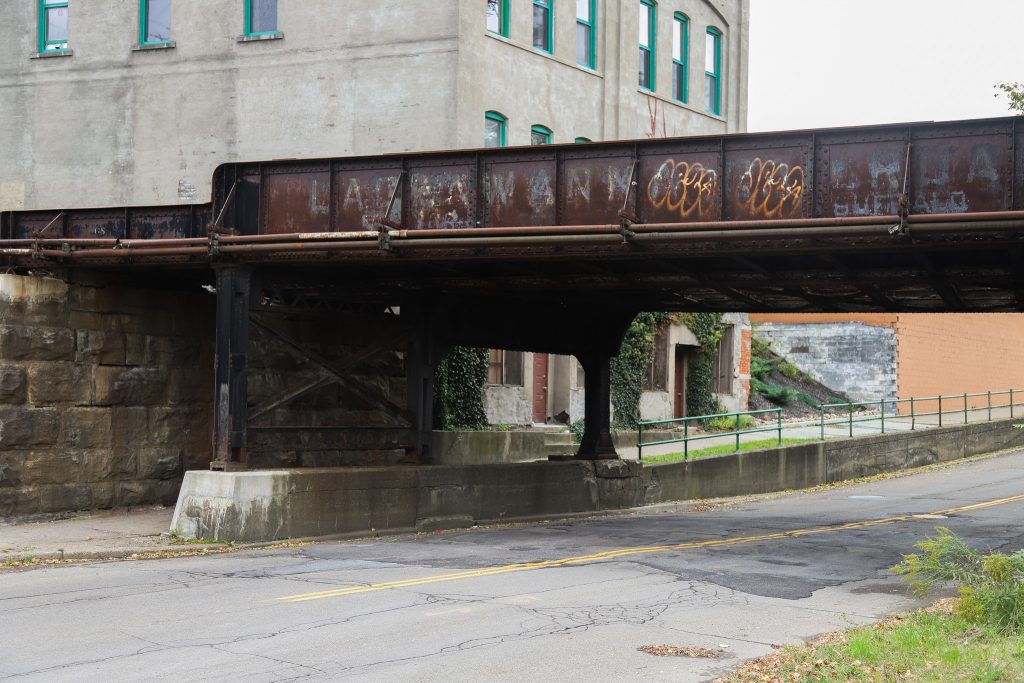After a 900-page city-funded report detailing Binghamton’s decaying railroad infrastructure and subsequent outrage from elected leaders, railroad giant Norfolk Southern has agreed to begin repairs on seven of its bridges.
Earlier this month, Binghamton Mayor Jared Kraham announced that the company had assembled a detailed plan to repair or replace the railway overpasses suffering most from severe structural deficiencies, including fragmenting concrete and rusting steel supports. Repairs have already begun on the railway bridge spanning Glenwood Avenue between Clinton and Brown Streets on Binghamton’s West Side. According to the proposed plan, further repairs are expected to be completed on similar bridges located on Jarvis, Murray and Water Streets throughout next year.
Norfolk Southern’s plan comes more than a month following the release of the City of Binghamton’s report, which found a majority of privately-owned railway overpasses in Binghamton were in “poor” or “severe” structural condition. Nearly half of the 25 bridges surveyed also had one or more “significant” structural or safety issues that merited further investigation. Released on Aug. 30, the report was commissioned earlier this year by HUNT-EAS, an outside engineering firm, to inspect the overpasses’ safety and structural health.
Unlike roads and vehicle-driven overpasses, which receive public funding and are owned by the government, railroads in the United States are privately-owned and are generally exempt from local oversight. Norfolk Southern owns the majority of the railway bridges in Binghamton surveyed in the report, though New York Susquehanna & Western Corporation owns some as well.
In a statement, Norfolk Southern expanded on their partnership with the city, saying that many repairs were previously planned.
“Norfolk Southern has been working closely with Binghamton’s leaders and the community,” the statement read. “Our bridge department has shared the details of our planned projects, and worked with the city to accelerate permits to expedite construction. Much of this work had already been planned as part of our regular bridge maintenance program, which is conducted under [Federal Railroad Administration] guidelines and designed to ensure the safety of our infrastructure. We’ll continue partnering closely to advance these projects and appreciate the public’s patience while they are safely completed.”
The City of Binghamton then sent copies of the report to both the private railroad companies and federal officials. Sen. Chuck Schumer and Sen. Kirsten Gillibrand wrote letters to the FRA and the CEO of Norfolk Southern respectively to call attention to concerns presented in the city’s report. They urged the FRA to conduct an independent audit of the bridges to better gauge the scale of safety concerns associated with the visual inspection conducted by the private firm.
“To further establish the rail infrastructure issues to be addressed in this community, and to set forth the outlines of a plan to address it, it is critical that FRA begin and maintain regular communication with the City of Binghamton, and that FRA conduct its own audit and inspection of the bridges found to have a structural or safety concern,” Schumer and Gillibrand wrote. “We ask that you [the FRA] give this matter full attention to maintain safety for the local community surrounding the bridges.”
In their letter to the CEO of Norfolk Southern, the senators encouraged the company to release its private inspection report conducted on the overpasses to evaluate any findings that might differ from those found in the city’s report. They also implored the company to protect the community by taking steps to eliminate any potential structural and safety issues presented in the city’s inspection.
“The findings highlighted by the City’s report are troubling to us, and have led us to call on the Federal Railroad Administration (FRA) to conduct its own independent, federal audit and inspection of Binghamton’s railroad bridges,” the Senators wrote. “If these visual concerns detailed in the City’s report are indeed indicative of larger structural or safety issues, it is Norfolk Southern’s duty to act swiftly to protect the community.”
The FRA launched a federal investigation of Binghamton’s railway infrastructure on Sept. 20 and began to conduct its internal audit of any structural integrity issues. The investigation is expected to take between 60 and 90 days to complete.
At the same time, Norfolk Southern had agreed to meet with city officials to discuss any potential safety issues arising from the poor structural state of Binghamton’s railway infrastructure. Norfolk Southern also plans to replace a steel railway bridge on Clinton Street in the First Ward. Kraham offered his support for Norfolk Southern’s planned course of action.
“I appreciate the railroad company’s responsiveness and willingness to act quickly to make sure its infrastructure is safe,” Kraham said. “My administration will continue to hold people accountable and deliver the results residents deserve.”
Brett Colucciello, a sophomore majoring in biochemistry, was pleased upon hearing that Norfolk Southern intends to repair its dilapidated infrastructure. He had previously expressed his concern last month about the structural findings contained within the city’s railway infrastructure report.
“It’s good to see that Norfolk Southern is rebuilding what they previously neglected,” Colucciello said. “I believe Binghamton can become a much more impressive city through actions like these.”
Editor’s Note (10/16): This article has been edited to include a statement from Norfolk Southern.



